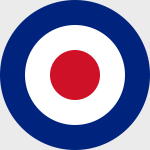Corgi AA34604 RAF De Havilland Mosquito Mk. VI Fighter-Bomber - HX922, EG-F, Group Captain P.C. Pickard, No. 487 Squadron, Amiens Raid, February 1944 (1:32 Scale)
"Never in the field of human conflict was so much owed by so many to so few."
- British Prime Minister Winston Churchill, commenting on the British airmen in the Battle of Britain
 The "Mossie," as it was known affectionately by its British crews, was both simple in construction and design. It was a twin engine, single boom aircraft that placed the pilot and navigator in a side-by-side sitting configuration. The Mosquito was one of the most cost effective aircraft ever built because it was constructed out of wood. Balsa was used for the plywood skin, Sitka spruce from Alaska and British Columbia for the wing spars, and Douglas Fir stringers and birch and ash for the longitudinal pieces. These were all held together with glue and wood screws. The result was an airplane that was easy to maintain, tolerant of battle damage, and simple to patch. It was faster than the Spitfire, flew higher than almost any other aircraft, and carried tremendous firepower over great distances. The bomber version operated with relative impunity over Germany til the end of the war, because the Luftwaffe never had a nightfighter fast enough to intercept it. Interestingly, the nightfighter versions of the Mosquito remained in production until 1947, two years after the war in Europe had ended.
The "Mossie," as it was known affectionately by its British crews, was both simple in construction and design. It was a twin engine, single boom aircraft that placed the pilot and navigator in a side-by-side sitting configuration. The Mosquito was one of the most cost effective aircraft ever built because it was constructed out of wood. Balsa was used for the plywood skin, Sitka spruce from Alaska and British Columbia for the wing spars, and Douglas Fir stringers and birch and ash for the longitudinal pieces. These were all held together with glue and wood screws. The result was an airplane that was easy to maintain, tolerant of battle damage, and simple to patch. It was faster than the Spitfire, flew higher than almost any other aircraft, and carried tremendous firepower over great distances. The bomber version operated with relative impunity over Germany til the end of the war, because the Luftwaffe never had a nightfighter fast enough to intercept it. Interestingly, the nightfighter versions of the Mosquito remained in production until 1947, two years after the war in Europe had ended.
This particular 1:32 scale replica of a Mosquito Mk. VI bomber was flown by the RAF's No. 487 Squadron which took part in the raid on the Amiens prison in February 1944. Sold Out!
Dimensions:
Length: 15-1/2 inches
Wingspan: 20-1/4 inches
Release Date: September 2012
Historical Account: "Operation Jericho" - Operation Jericho was a low-level World War II bombing raid by Allied aircraft on Amiens Prison in German-occupied France on February 18th, 1944. The object of the raid was to free French Resistance and political prisoners, 120 of whom were to be executed the following day.
Mosquito bombers succeeded in breaching the walls and buildings of the prison, as well as destroying guards' barracks. Of the 717 prisoners, 102 were killed, 74 wounded, and 258 escaped, including 79 Resistance and political prisoners, although two thirds were recaptured. One of the inmates was also privy to sensitive information concerning Operation Overlord.
As recounted in the Bible's Book of Joshua, the walls surrounding the city of Jericho - for which the operation was named - miraculously fell down.


